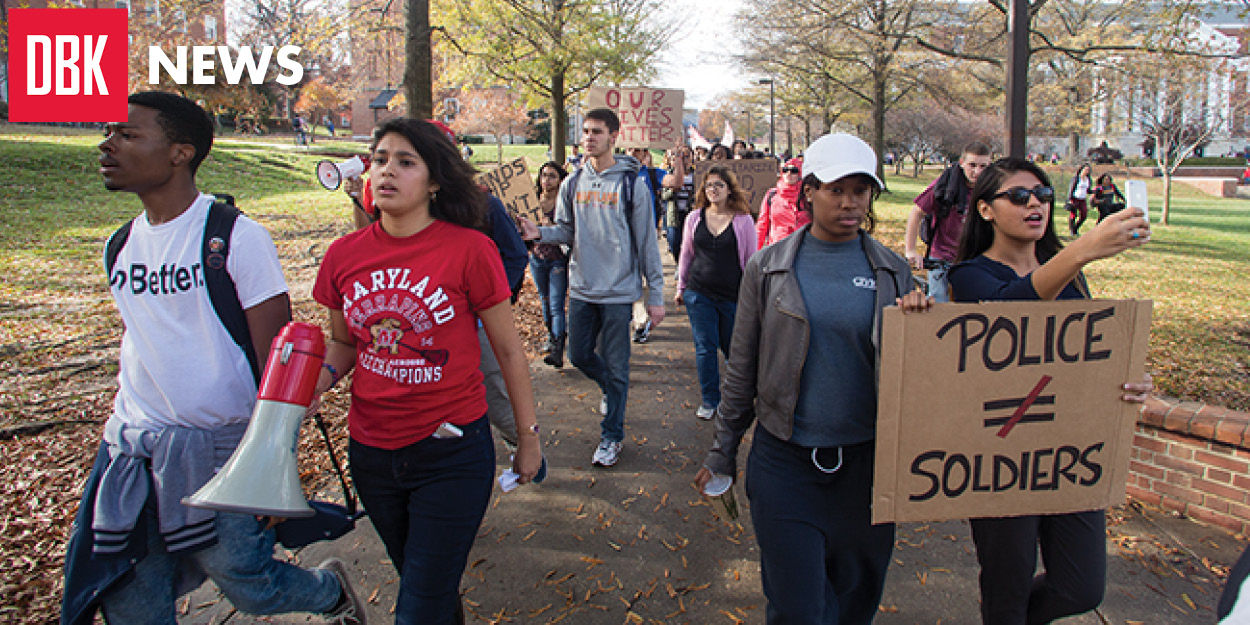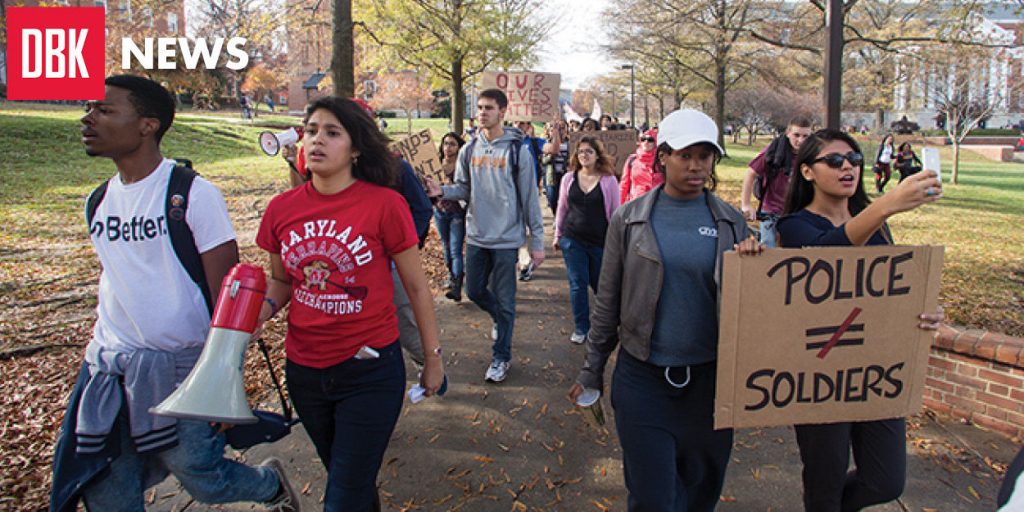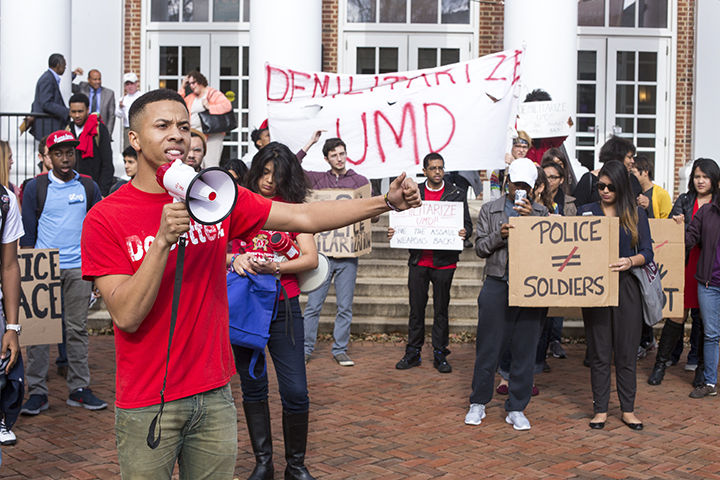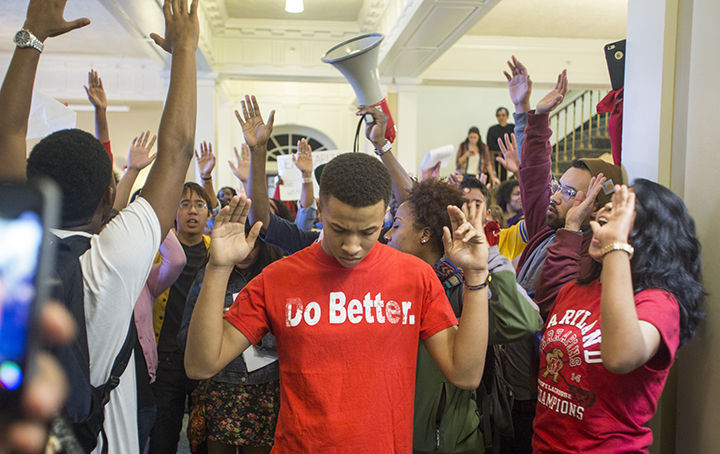Their chants echoed from outside Stamp Student Union, across McKeldin Mall and throughout the Main Administration Building Monday afternoon.
“No justice, no peace.” “Hands up, don’t shoot.” “Whose campus? Our campus.”
About 50 student protesters marched through the campus Monday as a response to the Aug. 9 shooting death of black teenager Michael Brown in Ferguson, Missouri, and the subsequent national dialogue about race relations.

Hands up
The protest came a few hours before a grand jury decided not to indict Darren Wilson, the white police officer who shot Brown.
“Every day you hear about another person being shot by a police officer and I don’t want that on my campus,” said Corinne Paul, a sophomore government and politics major. “[Michael Brown] made this so much more public. It made people realize that something needs to be changed, because how many more lives will be lost before we have a change?”
Much of the rally focused on the university police department’s participation in the Department of Defense’s 1033 program, as students marched in front of a huge white sign that read “Demilitarize UMD.”
The 1033 program, which supplies state and local law enforcement agencies with surplus military gear, granted this university’s police department 16 12-gauge shotguns, 50 M16 rifles, two transport vehicles and a $65,000 armored truck.
“We really don’t need to be that militarized in regards to our police force,” sophomore history major Ethan Weisbaum said. “It’s unnecessary, and considering the police brutality that has been growing in this country, it’s not okay for us to be providing a less safe environment for those in town.”
When the group reached the Main Administration building, they demanded to speak to university President Wallace Loh, who was not there. Instead, University Police Chief David Mitchell answered questions from the crowd and accepted on Loh’s behalf a letter listing the group’s demands.
The demands include establishing a student review board with appropriate power to review citizen complaints, issuing an official statement from the administration condemning the murder of Michael Brown and requiring officers to wear body cameras. The group of students said they expect their demands to be met by Dec. 10.
In response to the demand that University Police wear body cameras, Mitchell said the technology will be implemented within the department in the next four weeks.
“This has been in the works for about a year now,” Mitchell said. “Long before Ferguson we were in the process of acquiring body cameras. Why? They’re very effective. Our officers want body cameras. They protect the officer as well. It’s greater transparency, and I’m all in favor of it.”
The crowd stood together and — through a bullhorn — demanded to know why so many weapons and armored vehicles were needed on the campus. Mitchell explained that this campus houses nuclear material for the nuclear engineering program, and the Nuclear Regulatory Commission “mandates in federal law that whoever safeguards that material must be trained” with resources to protect them.

Protest
Mitchell added that weapons are needed by the university police in light of the recent string of shootings on college campuses, most recently at Florida State University on Nov. 20.
“When an active shooter comes on campus, we’re not going to pull a taser,” Mitchell said. “That wouldn’t make much sense, would it?”
While many were marching in protest, others were motivated by their own personal experiences.
“With police and with enforcement in general, myself and so many immigrant families get our houses raided by enforcement to separate our families and take them away,” said Yves Gomez, a senior biochemical engineering major. “And that’s why I can’t stand police officers because their job to protect us, but if you take our families away, you have a different view completely.”
After leaving the Main Administration Building, the group headed for the campus’s main entrance. They formed a circle and shared their reasons for marching together.
“It’s not just about Mike Brown, it’s about the two-tiered legal system that minorities deal with in this country,” said Gregory Minton, a junior enrolled in letters and sciences. “It’s unconscionable. We shouldn’t stand for it anymore.”
For senior Muftau Shinaba, the protest was about facing the future.
“I want my kids to be treated like human beings and nothing else. If anyone believes we are living in a post-racial society, they are lying,” the community health major said.
For freshman Julian Ivey, the importance of the protest lied in the diverse makeup of that concluding circle — there were people of all races, religions and sexual orientations represented.
“All that matters is that people realize this is a campus issue, and it’s a problem for every student,” the government and politics major said. “So now we are locking arms and walking together to show President Loh and [David Mitchell] that this is more than about just one person; it’s a campus problem, and we will stand together as one.”
About 50 people march through campus with demands for Loh, UMPD.
Julian Ivey, a freshman government and politics major, speaks to students outside Stamp Student Union as the group prepares to march across to the administration building to demand the demilitarization of the College Park Police Department
Julian Ivey, a freshman government and politics major, silently holds his hands up as about 50 student activists chant “Hands Up, Don’t Shoot” after speaking to Police Chief David Mitchell in the Administration Building.






